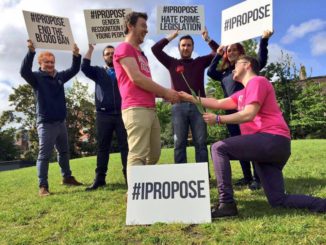
[dropcap]L[/dropcap]ady Gaga lies on a sofa, crying in pain as the whole right side of her body goes into spasm. One of her assistants massages her face and holds ice against it.
“It feels like there’s a rope pulling from my first toe all up my leg and then around my first rib and in my shoulder and then my neck” she tells the camera.
Her Netflix documentary, Gaga: Five Foot Two, chronicles her struggle with fibromyalgia. According to FibroIreland, this medical condition is defined by widespread chronic pain and related symptoms include fatigue, cognitive dysfunction, and reduced physical function.
Gaga also details the shame and self-consciousness that comes with suffering from chronic illnesses as she expresses her embarrassment and asks the camera “do I look pathetic?”.
More and more celebrities have been speaking out about their experiences with health issues in recent years. They can use their status to raise awareness of medical conditions that may not otherwise get the same level of coverage. But is this new-found openness about raising awareness or raising their profiles?
Senior Clinical Health Psychologist Vincent McDarby works in Our Lady’s Children’s Hospital, Crumlin. He specialises in diabetes and says that celebrities speaking about their own health issues can help young people “feel less different”.
According to McDarby, sports stars who speak about their illnesses can show young fans that their health does not necessarily have to curtail their sporting aspirations.
Recently, Dublin footballer Kevin Nolan was praised on social media for speaking candidly about his experience of playing football at an elite level with diabetes and coeliac disease on Up For The Match.
“Young people with sporting aspirations often think certain chronic illnesses will limit those or stop those altogether and when they see someone else who might have succeeded, it motivates them,“ McDarby said.
Elsa Anderling is a college student with type 1 diabetes. She finds it beneficial when public figures speak about their experiences of health issues.
“Many of us look up to public people and I think many can find strength and support in knowing they go through the same thing. Another part is also to reach out to the masses not affected, mainly to spread information and understanding.”
Despite the best efforts of influential people opening up discussions about chronic illnesses, there are still misjudged, throwaway comments by people in the public eye which illustrate some ignorance around such topics.
During the summer, singer Lorde described the complexities of maintaining her friendship with Taylor Swift and likened it to having a friend with “very specific allergies”.
“There are certain places you can’t go together. Certain things you can’t do. There are these different sets of considerations within the friendship. It’s like having a friend with an autoimmune disease,” Lorde told The Guardian.
Many people who suffer from autoimmune diseases took offence at what some saw as her trivialising their diseases. Likening such conditions to an inconvenience struck a nerve with sufferers who already feel as though their disease makes them a burden.
McDarby added that there can be another negative aspect to celebrity advocacy. “Misinformation can be damaging if people are listening more to what a celebrity says than what parents or a doctor might say.”
Halle Berry is a negative example McDarby cites. The actress claimed she “cured” herself of type 1 diabetes and was able to wean herself off medication by changing her diet. Quite the claim due to the fact that type 1 diabetes has always been, and remains, incurable. Doctors warned of the danger such claims could pose to impressionable diabetics who may have followed suit. They speculated that Berry must have been misdiagnosed, as type 2 diabetes can be sometimes be treated with a change in diet.
In this regard, the platform celebrities have to speak about health issues must be treated with caution. Discretion should be exercised when listening to celebrities who are not qualified to talk about the treatment of diseases, or in Berry’s case, talk about the wrong one.
“A celebrity has a voice that most don’t have and if what they’re saying is good and positive and proactive, well then that’s great but if what they’re saying is negative or incorrect it can be damaging,” according to McDarby.
Former chairman of the United Kingdom Public Health Association, Geoff Rayner argued that celebrity involvement in health campaigns does not deliver long term benefit in an opinion piece he wrote for the British Medical Journal. Rayner wrote that despite the initial attention celebrities attract, there is a “risk that the celebrity becomes the story.”
However, there is a benefit to be derived from celebrities who give you a real, unfiltered insight into the day to day plight of living with medical conditions. For Lady Gaga, it was showing us the reality behind her Poker Face.
Bridget Fitzhenry



